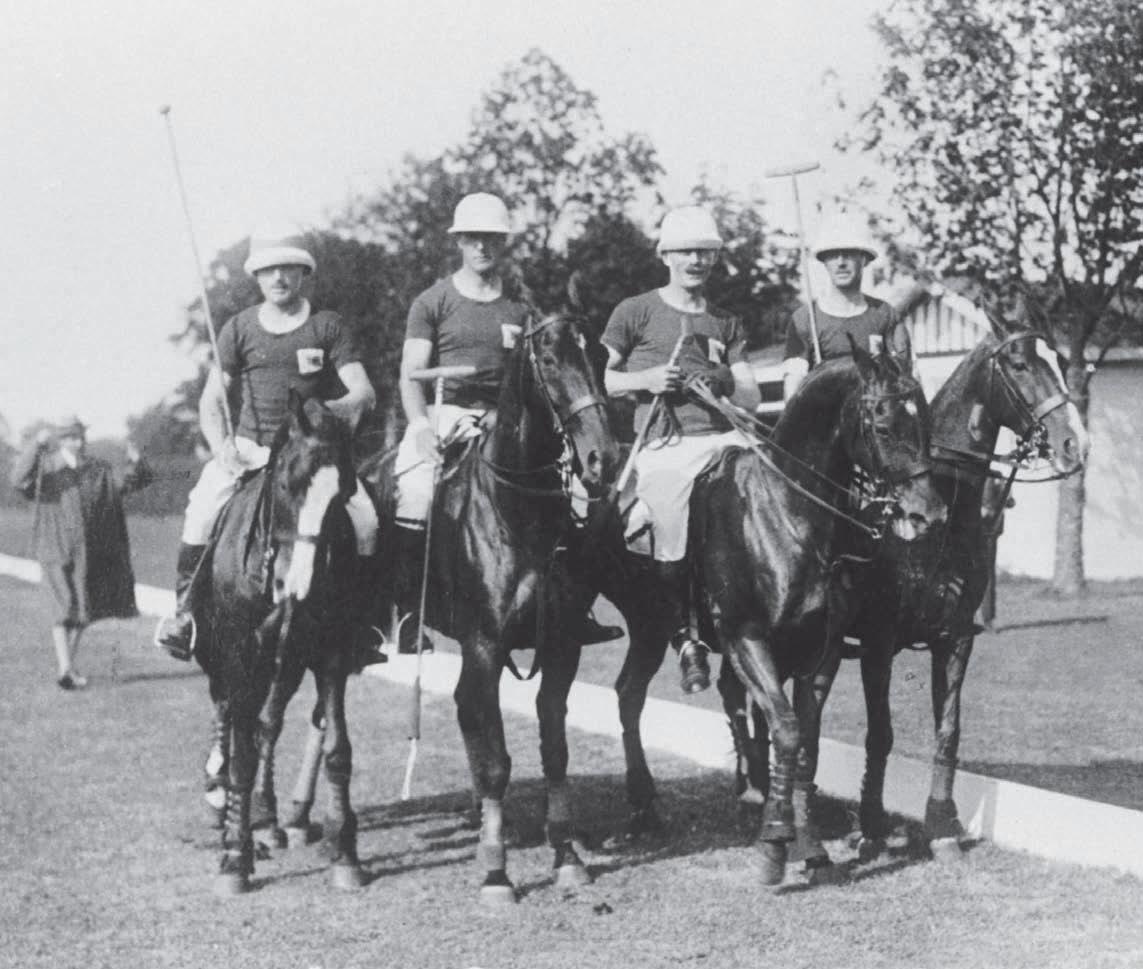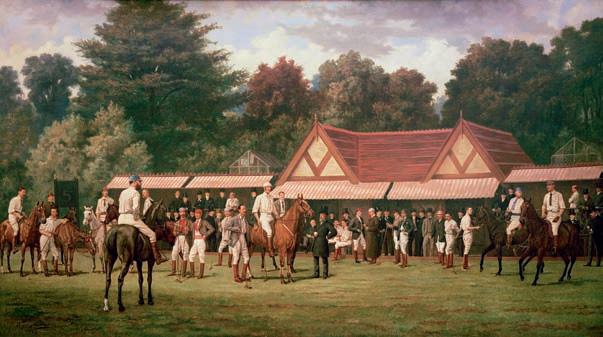
9 minute read
History
Britain’s global games
The story of modern sport is closely connected to the story of the British empire, says Simon Kuper
Left: The Great Britain polo team that won bronze at the 1924 Olympics in Paris

In smoggy Buenos Aires, amid all the Italian surnames, Edwardian Britain lives on. Sometimes in this town you can imagine you are in a former British colony, a Spanishspeaking version of India or Australia. Once the British built the railways here and exported the beef. Now the chicest club in town is the Jockey Club, the tearoom on the Calle Florida is called the Richmond, and you can find the Anglo-Argentines with their outdated accents in the Club Inglés. They drive out to the Hurlingham Club in the suburb of Hurlingham to play rugby, cricket, tennis (on the only grass courts in South America) and, of course, polo.
Outside Buenos Aires, somewhere in the Pampas, on David Shennan’s ranch ‘El Negrete’, the first polo was played in Argentina in 1875. A few years later, the English-language Buenos Aires Herald newspaper could comment: ‘We are glad to see that this noble game has been introduced into this country by Englishmen.’
Polo, and most of the rest of today’s global sporting landscape, is a relic of the British empire. Not just the official empire
In the late nineteenth century, British sailors, merchants and missionaries were busy spreading British games around the world like viruses
– the actual colonies – but the ‘informal empire’, the network of British business that once dominated a country like Argentina. The story of sport is a story of two empires: the British (which contrary to popular opinion still exists) and the American (which contrary to popular opinion barely exists at all). This is why the Argentines and almost everyone else play British sports, not American ones.
An early form of polo was played in Persia before the birth of Christ. The story of the modern game, however, begins in the middle of the nineteenth century when British army officers in India encountered it in the Himalayas. Eventually, a version of the game was written up in The Field, which inspired officers of the 10th Hussars, on home leave in Aldershot to play ‘hockey on horseback’ using walking sticks. Around this time the British were infected by a mania for writing the rules of sports, of which football, in 1863, was only the most famous example. In 1876 polo was codified in the Hurlingham Association Rules.
‘One has to make a distinction between the ancient game and the modern game,’ says polo historian Nigel à Brassard. ‘The modern game I would definitely call a British invention. Polo was being played by a group of Manipuris up in the foothills of the Himalayas, a slow game on very small horses, and would never have spread if a group of Britons hadn’t taken it back.’ Having codified the game, the British then re-exported it – chiefly to the US and Argentina – using the networks and prestige of their empire.
It’s no coincidence that all this happened in the late nineteenth century, the era that the historian Niall Ferguson calls ‘Anglobalisation’, when British sailors, merchants and missionaries were spreading British games like viruses. In 1889, for instance, the 21-year-old Englishman Frederick Rea landed on the Scottish island of South Uist to start work as a headmaster. Soon afterwards, two of his brothers visited carrying a football. Within 20 years soccer had conquered South Uist. Shinty, a stick sport played there for 1400 years, ‘was wiped like chalk from the face of the island’ according to Roger Hutchinson in the British football journal Perfect Pitch. In Argentina, polo similarly exterminated ‘gaucho’ games like pato, in which two teams on horseback fought for the possession of a live duck. Pato came to be viewed as uncivilised.
Football went around the world, but the other British team games – rugby, cricket, polo – tended to take root only in British colonies. Argentina was the exception, perhaps because it was so informally British.
Eduardo Archetti, the great Argentine anthropologist of sports, who died much too young thousands of miles from home in Norway, described the curious spread of polo at the bottom of the world. Argentina proved ideal territory because of its endless flat land and supply of good horses. By the 1890s, Archetti wrote, the game was being played mostly on estancias owned by landlords of British origin: ‘Descendants of British immigrants dominated polo until the 1930s.’
As with all British sports everywhere, polo got an initial boost from being seen as a game of British gentleman. Marketing people today would no doubt call it ‘aspirational’. Playing the game well was a way of borrowing some of the global prestige the British upper classes then possessed. This became obvious in 1924 after the Argentine polo team won gold at the Paris Olympics. ‘The victorious team,’ wrote Archetti, ‘was received in the harbour of Buenos Aires by thousands and thousands of people: they had won against the two economic world powers: they were champions of the world, and they had amazed the sophisticated Parisians and the European aristocracy.’
Judging by those cheering crowds, polo then carried about as much prestige as soccer. But polo was doomed in the global battle, and not just because of the expense involved in playing it. Before television, the best way of marketing a sport was the Olympic Games, and polo disappeared from the Olympics after Berlin in 1936. When TV arrived, the games that took off were the ones that did best on screen, like soccer, American football and basketball.

1
The US was mostly immune to British sports, or preferred to convert them into ‘American’ games like baseball or gridiron football. A few wealthy Americans did take up polo, however. When the US won the Westchester Cup in 1909, England ceased to be the undisputed world leader. Around the same time, the US was also usurping Britain’s role as military superpower. Yet the curious fact remains that despite their empire, the Americans never exported their sports as the British had.
Take baseball, the undisputed ‘national pastime’ of the US until American football surpassed it in the 1980s. Only in 2006 did baseball try to stage a serious world cup (the ‘World Baseball Classic’) and the tournament made it painfully obvious that only about 10 countries play the game seriously. That’s not much for the national pastime of the greatest power of the last 100 years. Baseball’s failure to conquer the world suggests how limited the American empire is compared to its British predecessor.
Baseball’s diffusion – such as it is – is a story well told in two recent books: Robert B. Edgerton’s Comparative Anthology of Baseball Around the World and Stefan Szymanski’s and Andrew Zimbalist’s National Pastime: How Americans Play Baseball and the Rest of the World Plays Soccer.
The US single-handedly made just two countries safe for baseball: Cuba and Japan. Even the Japanese almost fell for soccer or cricket instead, but baseball triumphed there in the 1880s, when, according to National Pastime, ‘Americans came to outnumber all other expatriate communities’.
That was about the extent of the American conquest. You might assume that they at least spread baseball to their backyard of the Dominican Republic, Puerto Rico, Venezuela, and the Yucatan region of Mexico. Yet according to Edgerton, it was Cubans – many of them slave owners – who in fact did most of the work.
The other great baseball colonialists were the Japanese. ‘Although baseball owed its birth in Asia to American sailors, educators, and missionaries, it was the Japanese who spread it across Asia,’ writes Edgerton. Japan’s occupying soldiers and prisoner-of-
1 Polo in the colonies, 1916 2 Polo at Hurlingham, 1890 3 English footballers, 1881 4 Persian polo, circa 1000 AD


war camps brought the game to Korea and Taiwan with such success that South Korea now suffers from baseball hooliganism, and the Taiwanese bet more than $2bn a year on baseball by telephone alone in the 1990s.
The Japanese also took the game to Thailand, Mongolia and even Belgium. In Brazil baseball is dominated by ‘NippoBrazilian’ descendants of Japanese immigrants, while Moscow’s only baseball, Edgerton points out, was ‘funded by a wealthy Japanese fan’.
Americans did little proselytising for baseball, partly because they started late. As Szymanski and Zimbalist note: ‘The US had only an incipient political empire from the spoils of the so-called Spanish-American War of 1898 and only scant foreign investment until after World War I.’ By the time the US girdled the globe, British colonialists had got there first. Soccer, therefore, had first-mover advantage in most countries soccer. Nelson Mandela, to cite one example out of millions, played soccer at his British-inspired boarding school and university. It’s significant that none of the 10 strongest baseball nations had much of a British tradition.
Even at its zenith the American empire didn’t help baseball much. This was chiefly because Americans seldom bothered spreading it. John Gray, a London School of Economics professor writing in the New York Review of Books recently, suggests why. ‘America lacks most of the attributes that make an imperial power,’ he argues. ‘The US does not govern any countries, and even when it sends troops abroad, it tends to regard the relationship as transitory: get the job done, come home. There are few American elites living their lives in foreign countries, learning the local language, building alliances with local rulers, and disseminating their games the way the British used to do.’ All those American soldiers, businessmen, film stars, Peace Corps volunteers and immigrants visiting the ‘old country’ did little for baseball.
The closest thing America has to a global game is basketball. David Stern, commissioner of the National Basketball Association, sitting in his office overlooking Fifth Avenue in New York, chuckles at his good fortune that American missionaries to China at the turn of the twentieth century took a basketball with them. Stern himself has been flying around the world proselytising for the game since his maiden voyage as commissioner to Italy in 1984. Yet even after all those air miles, basketball outdoes British sports only in China, the Philippines, Bhutan and a very few other countries. American football – the new US national pastime – hardly even tried to go global until it staged a regular-season game at Wembley last October.
Viewed broadly, the failure of American sports casts doubt on the notion that American culture has conquered the world. The British empire got there first, and was more ambitious. That’s why we still live in a surprisingly British world. It’s not just sport: the language of the British empire, thanks to Americans, has gone global. The six bestselling novels of the last hundred years are all British: four Harry Potters, one Agatha Christie, and one J.R. Tolkien. The bestselling band ever is The Beatles. And England – half a medium-sized island – has the world’s most popular football league. Fifty years after Suez, it all amounts to a posthumous victory for the British empire.










